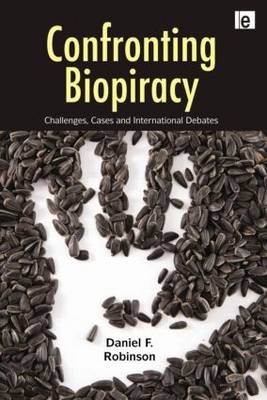
Confronting Biopiracy
Challenges, Cases and International Debates
Seiten
2011
Earthscan Ltd (Verlag)
978-1-84971-432-7 (ISBN)
Earthscan Ltd (Verlag)
978-1-84971-432-7 (ISBN)
- Titel z.Zt. nicht lieferbar
- Versandkostenfrei innerhalb Deutschlands
- Auch auf Rechnung
- Verfügbarkeit in der Filiale vor Ort prüfen
- Artikel merken
The aim of this book is to provide the most detailed, coherent analysis of the issue of biopiracy to date. The book synthesises the rise of the issue and increasing use of the term by activists and negotiators to form a critical understanding of the themes, implications and politics of biopiracy.
'Biopiracy' refers either to the unauthorized extraction of biological resources, such as plants with medicinal properties, and associated traditional knowledge from indigenous peoples and local communities, or to the patenting of spurious 'inventions' based on such knowledge or resources without compensation. Biopiracy cases continue to emerge in the media and public eye, yet they remain the source of considerable disagreement, confusion, controversy and grief. The aim of this book is to provide the most detailed, coherent analysis of the issue of biopiracy to date.
The book synthesizes the rise of the issue and increasing use of the term by activists and negotiators in the World Trade Organization (WTO) and the Convention on Biological Diversity (CBD), to form a critical understanding of the themes, implications and politics of biopiracy. Taking a case-study based approach, derived from interviews and fieldwork with researchers, government, industry, local farmers, healers and indigenous people, the author sequentially documents events that have occurred in biopiracy and bioprospecting controversies. Implications and ethical dilemmas are explored, particularly relating to work with local communities, and the power relations entailed. Detailing international debates from the WTO, CBD and other fora in an accessible manner, the book provides a unique overview of current institutional limitations and suggests ways forward. Options and solutions are suggested which are relevant for local communities, national governments, international negotiators, NGO and interest groups, researchers and industry.
'Biopiracy' refers either to the unauthorized extraction of biological resources, such as plants with medicinal properties, and associated traditional knowledge from indigenous peoples and local communities, or to the patenting of spurious 'inventions' based on such knowledge or resources without compensation. Biopiracy cases continue to emerge in the media and public eye, yet they remain the source of considerable disagreement, confusion, controversy and grief. The aim of this book is to provide the most detailed, coherent analysis of the issue of biopiracy to date.
The book synthesizes the rise of the issue and increasing use of the term by activists and negotiators in the World Trade Organization (WTO) and the Convention on Biological Diversity (CBD), to form a critical understanding of the themes, implications and politics of biopiracy. Taking a case-study based approach, derived from interviews and fieldwork with researchers, government, industry, local farmers, healers and indigenous people, the author sequentially documents events that have occurred in biopiracy and bioprospecting controversies. Implications and ethical dilemmas are explored, particularly relating to work with local communities, and the power relations entailed. Detailing international debates from the WTO, CBD and other fora in an accessible manner, the book provides a unique overview of current institutional limitations and suggests ways forward. Options and solutions are suggested which are relevant for local communities, national governments, international negotiators, NGO and interest groups, researchers and industry.
Daniel F. Robinson is Lecturer at the Institute of Environmental Studies, University of New South Wales, Australia
Introduction 1. Collecting; Prospecting; Piracy 2. International Legal Backdrop 3. Patent-Related Biopiracy Cases 4. Non-Patent Biopiracy Cases 5. Implications and Ethical Dilemmas: What have the Cases Shown? 6. Current Debates and Ways Forward: Internationally and Regionally 7. Current Debates and Ways Forward: National and Local Approaches. Conclusions
| Erscheint lt. Verlag | 3.8.2011 |
|---|---|
| Verlagsort | London |
| Sprache | englisch |
| Maße | 156 x 234 mm |
| Gewicht | 190 g |
| Themenwelt | Naturwissenschaften ► Biologie ► Botanik |
| Naturwissenschaften ► Biologie ► Ökologie / Naturschutz | |
| Recht / Steuern ► Allgemeines / Lexika | |
| Recht / Steuern ► EU / Internationales Recht | |
| Recht / Steuern ► Wirtschaftsrecht ► Urheberrecht | |
| Technik ► Umwelttechnik / Biotechnologie | |
| ISBN-10 | 1-84971-432-0 / 1849714320 |
| ISBN-13 | 978-1-84971-432-7 / 9781849714327 |
| Zustand | Neuware |
| Haben Sie eine Frage zum Produkt? |
Mehr entdecken
aus dem Bereich
aus dem Bereich
Gefäßpflanzen: Grundband
Buch | Hardcover (2021)
Springer Spektrum (Verlag)
44,99 €
ein Baum erzählt seine erstaunliche Geschichte
Buch | Hardcover (2024)
Ludwig (Verlag)
23,00 €


